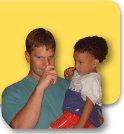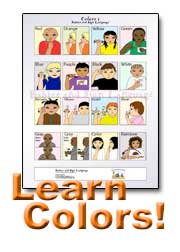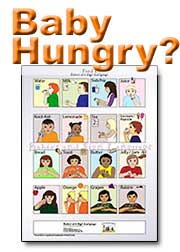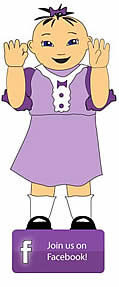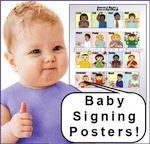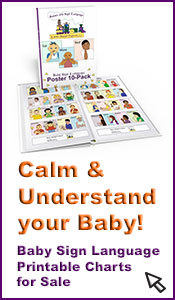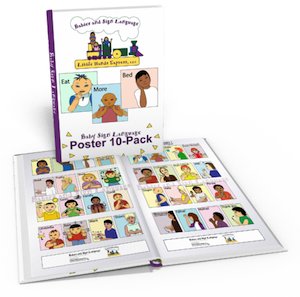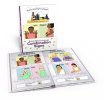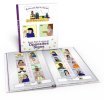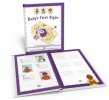Aphasia Communication – Treatment Using Sign Language
With Aphasia, communication can be frustrating for most. Aphasia is the loss of the ability to use and/or understand language; due to an injury to the specialized areas of the brain that control language. (These areas are almost always in the left hemisphere. However, it has been found that many left-handed people have language areas in both hemispheres of the brain. These people can suffer aphasia from injuries to either side.)
What is Aphasia?
The term aphasia refers to a loss of communication skills that were previously learned; it doesn't apply to children who have never developed language skills. Aphasia is not a muscle weakness or cognitive disorder.
There are many different types of aphasia and it can occur during any stage of life - you may know an older person who has suffered from aphasia after having a stroke.
There also isn't any evidence that shows a connection between aphasia and age, gender, or race. However, Acquired Childhood Aphasia (or LKS, Landau-Kleffner syndrome) is generally seen in children between the ages of 3 and 7.
Aphasia can occur in children who have experienced a brain tumor, an infection such as encephalitis, an accident that caused a stroke, or head trauma. It can also co-occur with speech disorders like apraxia or dysarthria, or other brain disorders.
The symptoms of aphasia can be very mild to very severe. It affects one or more of a person's language functions, including:
- Expressive language (speech, repetition, and naming)
- Receptive language (hearing comprehension)
- Reading
- Writing
If your child has aphasia you might notice that he or she has difficulties with:
- Comprehending language – aphasia sufferers don't understand what you are saying
- Pronouncing or forming words he or she had no problem with before
- Speaking spontaneously
- Completing sentences
- Either not being able to repeat a phrase, or persistently repeating the same phrase
- Substituting letters, syllables, or words (this inability is called paraphasia)
- Speaking in a grammatically correct way
- Stressing the correct syllables and words, or using a natural rhythm in his/her speech
- Reading and writing, if he/she could read and write previously
- Constantly creating and using nonsense words, or stringing together very long and nonsensical sentences.
Aphasia can also cause your child to have problems with his or her motor speech abilities, such as the ability to make speech sounds or swallow. Children with LKS may also experience seizures.
Aphasia Treatment
In some cases, aphasia can be recovered from with no treatment - this is generally occurs after a stroke or injury that temporarily cuts off the blood flow to the brain, but the flow is quickly restored. In this sort of circumstance, language abilities tend to restore themselves in a matter of days. In most cases, though, treatment is needed and language skills do not return to normal nearly as quickly or as completely.
The good news is, children (especially under the age of 10) are far more likely to recover their language skills. This is because their healthy brain tissue is more likely to take over the duties of the damaged nerve cells.
The Aphasia treatment most often given to children with aphasia is speech and language therapy. This can be started as soon as your child's condition allows it. The therapist will work with your child on building and strengthening his or her remaining language abilities, and will try to find other means of communication to make up for the abilities that have been lost. This is when sign language may be able to help your child.
Although sign language is in fact a language and therefore can be lost with other language skills in a person with aphasia's mind, if your child does not already know sign, he or she can use it as a gesturing tool.
Since gestures and symbols are stored in a separate part of the brain from language, your baby or child can benefit from using sign languge as a different way to communicate. Your child may not be able to say what it is that he or she wants, but making a gesture, or sign, that you will understand to mean "water" will not be as difficult.
Therapists encourage patients with aphasia to use gestures more often. This is because gestures help the listener understand and better interpret what your child may be saying, or trying to say.
It also has been said that gestures help us to compose language. Sign language can be looked at as a set of gestures to your child who did not previously know sign language, or develop it in the same part of his or her brain.
Therefore, sign can help your child in many ways:
- Signs can stand in for words your child may not remember. If your child wants to say 'car,' for example, he or she might make the sign for 'car' - which imitates a driving motion.
- Sign can help clarify what your child is talking about. For instance, your child might want to say, "Will you drive me to the park?" but can only come up with, "Mommy.. go.. in red.. big place?" Here, if your child made the signs for 'car' and 'play,' you would understand better what he or she wanted to do.
- Sign can help to cue speech. If your child's therapist has him or her repeat words while making the sign, it can trigger your child's memory. This can also set a symbolic and visual clue for your child to remind him or herself of what is trying to be said.
- Sign language is also a good way to maintain your child's preserved language abilities. If your child uses signs while he/she is speaking, those signs may help your child remember specific words. This keeps the language functions of the brain working and can help strengthen them.
Do not fear sign language becoming a crutch!
People with aphasia want to be able to communicate with you. Your child's therapist will encourage him or her to use sign in addition to speech therapy. Aphasia can be better managed. It is very unlikely that sign will replace spoken language completely.
Over time, the use of sign language - along with other techniques and communication aids used in therapy - may be able to lead your child with aphasia to a nearly full recovery of his or her language skills.
References:
http://en.wikipedia.org/wiki/Aphasia
http://www.medicinenet.com/aphasia/article.htm
http://www.hmc.psu.edu/childrens/healthinfo/a/aphasia.htm
http://www.aphasianow.org/index.php?pageid=Jane_M
Baby Sign Language Benefits for Children with Special Needs
Baby Signing Benefits for Deaf Children
Benefits of Baby Signing for Parents

